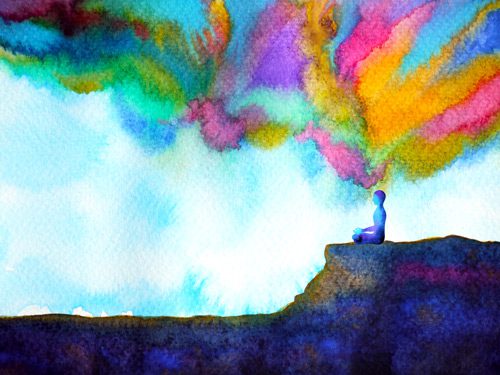In addiction recovery, creativity can be your greatest strength.
Tapping into your creative potential via art therapy can boost your confidence and allow you to view recovery-related challenges in a new way. Under the guidance of a trained art therapist, you can learn how art acts as a tool to promote the wellness-focused lifestyle that is key to lasting sobriety.
What Is Art Therapy?
Art therapy is a form of psychotherapy revolving around the encouragement of free self-expression through painting, drawing, sculpting, woodworking, photography, or other creative activities. Art therapy can be used as an aid to diagnose mental health conditions but is most often a tool for better understanding how emotions, thoughts, and feelings affect actions.
An art therapist is a professional with a master’s degree or higher from an integrated program studying psychotherapy and visual arts. The initials ATR after a therapist’s name indicate that they are registered with the Art Therapy Credentials Board (ATCB). The initials ATR-BC indicate that the therapist is both registered and board-certified by the ATCB.
Sometimes, community-based programs offer workshops with professional artists who discuss how to use art to enhance mental wellbeing. While these types of programs are certainly beneficial, they should not be confused with art therapy provided by someone with specialized training in using the visual arts to promote psychotherapy treatment goals.
Common techniques used in art therapy include:
- Active Imagination: The client uses free association to look at artwork and describe what they see. These observations then become the basis of a discussion of relevant issues surrounding the recovery process.
- Gestalt Method: The artwork is a starting point for an open-ended discussion between the patient and therapist about issues related to addiction treatment.
- Third-Hand Approach: The therapist helps the client create a work of art. For example, the therapist might select the medium to use and offer a prompt such as “If addiction had a personality, what would it look like?” or “Create your own permission slip.” However, the client remains in control of the vision and direction for final product.
Who Can Benefit from Art Therapy?
Some of the key benefits of incorporating art therapy into a person’s substance abuse treatment program include:
- Increase self-esteem
- Relieve stress
- Provide a way to cope with depression or anxiety
- Encourage self-awareness
- Offer insight to help resolve past emotional conflicts
- Lessen feelings of shame surrounding addiction and past addiction-related behaviors
- Overcome denial about the severity of a substance use disorder
- Increase motivation to work towards positive change
Art therapy is often recommended as a way to help participants heal from past trauma. Addiction often begins as a way to cope with physical abuse, domestic violence, sexual assault, combat experience related to military service, and other forms of trauma. Art therapy offers a way to process memories related to the trauma that may be too painful to confront directly. Over time, this promotes feelings of balance and control that enhance the benefits of other forms of substance abuse treatment.
As a form of nonverbal communication, art therapy may be particularly appealing to people who struggle to find the right words to express the challenges they are facing in their recovery. Someone who has found talk therapy to be of limited effectiveness might discover that art therapy provides a better way to move forward in the healing process. Alternatively, art therapy can supplement talk therapy by providing a concrete visible object that can be discussed with the therapist in an individual or group setting.
No Experience Needed
Contrary to popular belief, you don’t need any background in art or natural artistic talent to benefit from art therapy. This form of addiction treatment focuses on the process of creating art, not the end result. You may feel inspired to experiment with different mediums and techniques as you progress in your recovery journey, but all you need to begin is an open mind and a commitment to staying sober.
How Is Art Therapy Related to Other Forms of Holistic Treatment for Addiction?
No two people with addiction are exactly alike, which means that treatment plans must be personalized to fit individual needs and recovery goals. Art therapy may be used with other forms of holistic treatment such as music therapy, animal therapy, experiential therapies, yoga, meditation, acupuncture, or massage.
At Pennsylvania’s Mountain Laurel Recovery Center, we are committed to helping men and women struggling with drug or alcohol addiction build a firm foundation for lasting sobriety. Our inpatient treatment program incorporates evidence-based cognitive behavioral therapy as well as a wide range of holistic treatments designed to promote healing of the mind, body, and spirit.

